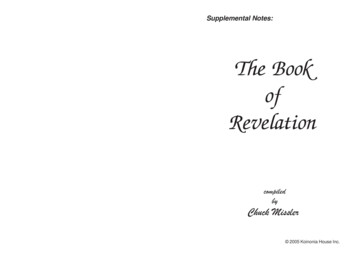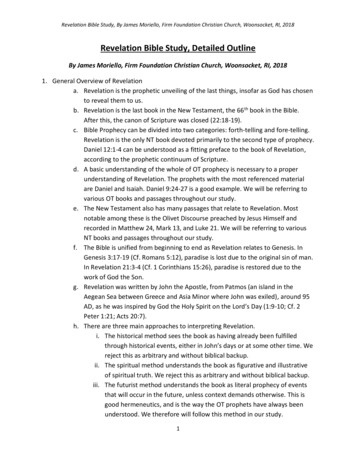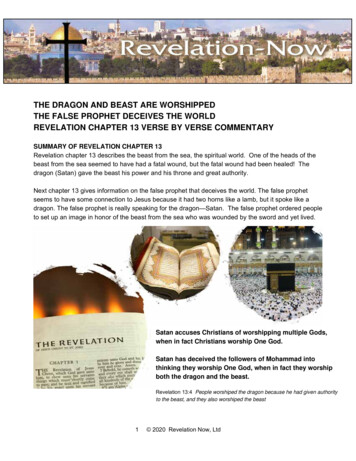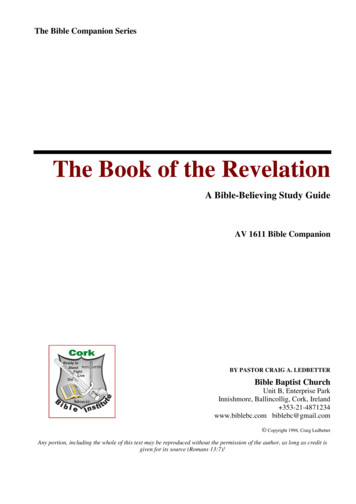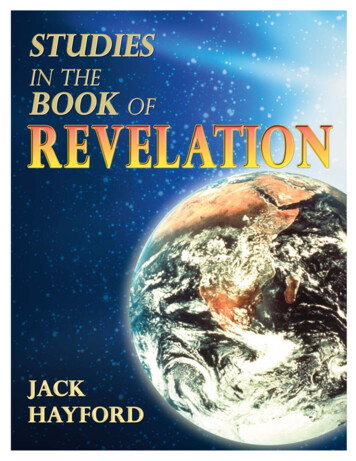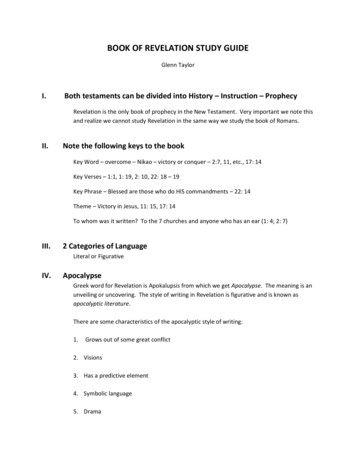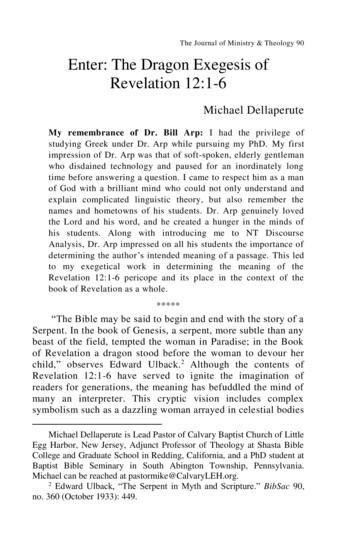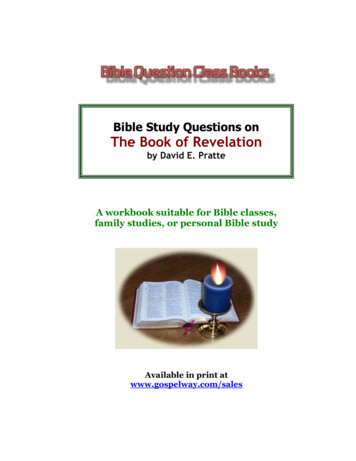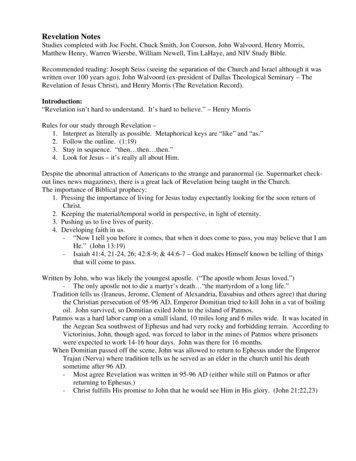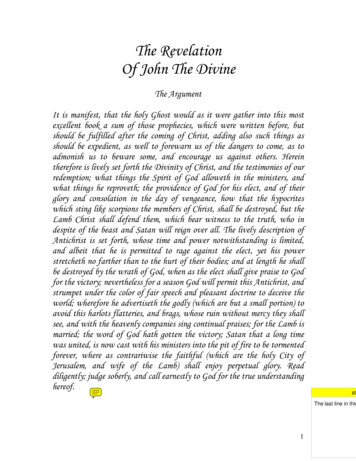
Transcription
The RevelationOf John The DivineThe ArgumentIt is manifest, that the holy Ghost would as it were gather into this mostexcellent book a sum of those prophecies, which were written before, butshould be fulfilled after the coming of Christ, adding also such things asshould be expedient, as well to forewarn us of the dangers to come, as toadmonish us to beware some, and encourage us against others. Hereintherefore is lively set forth the Divinity of Christ, and the testimonies of ourredemption; what things the Spirit of God alloweth in the ministers, andwhat things he reproveth; the providence of God for his elect, and of theirglory and consolation in the day of vengeance, how that the hypocriteswhich sting like scorpions the members of Christ, shall be destroyed, but theLamb Christ shall defend them, which bear witness to the truth, who indespite of the beast and Satan will reign over all. The lively description ofAntichrist is set forth, whose time and power notwithstanding is limited,and albeit that he is permitted to rage against the elect, yet his powerstretcheth no farther than to the hurt of their bodies; and at length he shallbe destroyed by the wrath of God, when as the elect shall give praise to Godfor the victory; nevertheless for a season God will permit this Antichrist, andstrumpet under the color of fair speech and pleasant doctrine to deceive theworld; wherefore he advertiseth the godly (which are but a small portion) toavoid this harlots flatteries, and brags, whose ruin without mercy they shallsee, and with the heavenly companies sing continual praises; for the Lamb ismarried; the word of God hath gotten the victory; Satan that a long timewas united, is now cast with his ministers into the pit of fire to be tormentedforever, where as contrariwise the faithful (which are the holy City ofJerusalem, and wife of the Lamb) shall enjoy perpetual glory. Readdiligently; judge soberly, and call earnestly to God for the true understandinghereof.1
Revelation 1. 3Revelation 2. 7Revelation 3. 12Revelation 4. 16Revelation 5. 18Revelation 6. 21Revelation 7. 24Revelation 8. 28Revelation 9. 31Revelation 10. 36Revelation 11. 38Revelation 12. 44Revelation 13. 48Revelation 14. 54Revelation 15. 59Revelation 16. 61Revelation 17. 65Revelation 18. 70Revelation 19. 74Revelation 20. 78Revelation 21. 82Revelation 22. 862
Revelation 12 He declareth what kind of doctrine is here handled, 8 even his that is the beginning and ending.12 Then the mystery of the seven Candlesticks and stars, 20 is expounded.1 The (1) (a) Revelation of (b) Jesus Christ, which (*) God gave unto him, to shewunto his servants things which must shortly be ( ) done; which he sent, andshewed by his Angel unto his servant John,(1) This Chapter hath two principal parts, the title or inscription, which standeth in stead of anexordium; and a narration going before the whole prophecy of this book. The inscription is double,general and particular. The general containeth the kind of prophecy, the author, end, matter,instruments, and manner of communicating the same, in the first verse; the most religiousfaithfulness of the Apostle as public witness, verse two; And the use of communicating the sametaken from the promise of God, and from the circumstance of the time, the third verse.(a) An opening of secret and hid things.(b) Which the Son opened to us out of his Father's bosom by Angels.(*) Christ received this revelation out of his Father's bosom as his own doctrine, but it was hid inrespect of us so that Christ as Lord and God revealed it to John his servant by the ministry of hisAngel, to the edification of his Church.( ) To the good and bad.2 Who bare record of the word of God, and of the testimony of Jesus Christ, andof all things that he saw.3 Blessed is he that readeth, and they that hear the words of this (*) prophecy, andkeep those things which are written therein; for the time is ( ) at hand.(*) Which expoundeth the old prophets, and sheweth what shall come to pass in the New Testament.( ) And began even then.4 (2) John to the ( ) seven Churches which are in Asia, Grace be with you, andpeace (3) from him, (c) Which (*) is, and Which was, and Which is to come, andfrom (4) the (d) ( ) seven Spirits which are before his Throne,(2) This is the particular or singular inscription, wherein salutation is written unto certain Churchesby name, which represent the Church; and the certainty and the truth of the same is declared, fromthe Author thereof, unto the eighth verse Revelation 1:8 .( ) Meaning the Church universal.(3) That is, from God the Father, eternal, immortal, immutable; whose unchangeableness Johndeclareth by a form of speech which is undeclined. For there is no incongruity in this place, where, ofnecessity the words must be attempted unto the mysteries, and not the mysteries corrupted orimpaired by the word.(c) By these three times, Is, Was, and Shall be, is signified the word Jehovah, which is the propername for God.(*) Exodus 3:14 .(4) That is, from the holy Ghost which proceedeth from the Father and the Son. This Spirit is one inperson according to his subsistence; but in communication of his virtue, and in demonstration of hisdivine works in those seven Churches, doeth so perfectly manifest himself, as if there were so manySpirits, every one perfectly working in his own Church, wherefore after Revelation 5:6; they arecalled the seven horns and seven eyes of the Lamb, as much to say, as his most absolute power and3
wisdom; and in Revelation 3:1, Christ is said to have there seven Spirits of God, and Revelation 4:5, itis said, that seven lamps do burn before his throne, which also are those seven Spirits of God. Thatthis place ought to be so understood, it is thus proved. For first grace and peace is asked by prayer ofthis Spirit, which is a divine work, and in action incommunicable, in respect of the most high Deity.Secondly, he is placed between the Father and the Son, as set in the same degree of dignity andoperation with them. Besides he is before the throne as of the same substance with the Father and theSon; as the seven eyes and seven horns of the Lamb. Moreover, these spirits are never said to adoreGod, as all other things are. Finally, that is the power whereby the Lamb opened the book, and loosedthe seven seals thereof when none could be found amongst all creatures by whom the book might beopened Revelation 5:1-10 ; Of these things long ago, Master John Luide of Oxford wrote learnedlyunto me. Now the holy Ghost is set in order of words before Christ, because there was in that whichfolloweth, a long process of speech to be used concerning Christ.(d) These are the seven spirits, which are afterward Revelation 5:6, called the horns and eyes of theLamb, and are now made as a guard waiting upon God.( ) That is, from the holy Ghost; or these seven Spirits were ministers before God the Father andChrist, whom after he calleth the horns and eyes of the Lamb, Revelation 5:6; In alike phrases Paultaketh God, and Christ, and the Angels to witness, 1 Timothy 5:21 .5 And from Jesus Christ, (5) which is the (*) faithful witness, and ( ) the firstbegotten of the dead, and the Prince of the Kings of the earth, unto him thatloved us, and washed us from our sins in his ( ) blood,(5) A most ample and grave commendation of Christ, first from his offices the Priesthood andkingdoms; secondly from his benefits, as his love toward us, and washing us with his blood, in thisverse, and communication of his kingdom and Priesthood with us; thirdly, from his eternal glory andpower, which always is to be celebrated of us; Revelation 1:6 . Finally, from the accomplishment of allthings once to be effected by him, at his second coming, what time he shall openly destroy thewicked, and shall comfort the godly in the truth; Revelation 1:7 .(*) Psalm 89:38 .( ) 1 Corinthians 15:21; Colossians 1:18 .( ) Hebrews 9:14; 1 Peter 1:19; 1 John 1:9 .6 And made us (*) Kings and Priests unto God even his Father, to him be gloryand dominion for evermore. Amen.(*) 1 Peter 2:5 .7 Behold, he cometh with (*) clouds, and every (e) eye shall see him, yea, eventhey which ( ) pierced him through; and all kindreds of the earth shall wail ( )before him, Even so, Amen.(*) Isaiah 3:14; Matthew 24:30; Jude 1:14 .(e) All men.( ) They that contemned Christ and most cruelly persecuted him, and put him to death, shall thenacknowledge him.( ) Or, for him.8 (6) I (*) am (f) ( ) Alpha and Omega, the beginning and the ending, saith theLord, Which is, and Which was, and Which is to come, even the Almighty.(6) A confirmation of the salutation aforegoing, taken from the words of God himself; in which heavoucheth his operation in every singular creature, the immutable eternity that is in himself, and hisomnipotency in all things; and concludeth in the unity of his own essence, that Trinity of personswhich was before spoken of.4
(*) Revelation 21:6; Revelation 22:13 .(f) I am he before whom there is nothing, yea, by whom everything that is made, was made and shallremain though all they should perish.( ) Alpha and Omega are the first and last letters of the alphabet of the Greeks.9 (7) I John, even your brother, and companion in tribulation, and in thekingdom and patience of Jesus Christ, was in the (g) isle called Patmos, for theword of God, and for the witnessing of Jesus Christ.(7) The narration opening the way to the declaring of the authority and calling of John the Evangelistin this singular Revelation, and to procure faith, and credit unto this prophecy. This is the second partof this Chapter, consisting of a proposition, and an exposition. The proposition sheweth, first whowas called unto this Revelation, in what place, and how occupied, Revelation 1:9 . Then at what timeand by what means, namely, by the Spirit and the word, and that on the Lord's day, which day eversince the resurrection of Christ, was consecrated for Christians unto the religion of the Sabbath; that isto say, to be a day of rest, Revelation 1:10 . Thirdly, who is the author that calleth him, and what is thesum of his calling.(g) Patmos is one of the isles of Sporas, whither John was banished as some write.10 And I was ravished in (h) spirit on (*) the (i) Lord’s day, and heard behind me agreat voice, as it had been of a trumpet,(h) This is that holy ravishment, and being as it were carried out of the world were cognizant withGod, and so Ezekiel saith often that he was carried from place to place of the Lord’s Spirit, and thatthe Spirit of the Lord fell upon him.(*) Which some call Sunday.(i) He calleth it the Lord's day, which Paul calleth the first day of the week; 1 Corinthians 16:2 .11 Saying, I am (*) Alpha and Omega, the first and the last: and that which thouseest, write in a book, and send it unto the ( ) seven Churches which are in Asia,unto Ephesus, and unto Smyrna, and unto Pergamos, and unto Thyatira, andunto Sardis, and unto Philadelphia, and unto Laodicea.(*) I am he before whom nothing was, yea, by whom whatsoever is made, was made, and he thatshall remain when all things shall perish, even I am the eternal God.( ) Of the which some were fallen; others decayed, some were proud, others negligent; so that hesheweth remedy for all.12 (8) Then I turned back to (k) see the ( ) voice, that spake with me. (9) And whenI was turned, I saw (*) seven golden candlesticks,(8) The exposition, declaring the third and last point of the proposition (for the other points areevident of themselves) wherein is spoken first of the author of his calling unto the seventeenth verse.Secondly, of the calling itself unto the end of the Chapter; Revelation 1:17-20 . And first of all theoccasion is noted in this verse, in that John turned himself towards the vision, after is set down thedescription of the author in the verses following, Revelation 1:13-16 .(k) To see him whose voice I had heard.( ) That is, him whose voice I heard.(9) The description of the Author, which is Christ; by the candlesticks that standeth about him, that is,the Churches that stand before him, and depend upon his direction. In this verse, Revelation 1:13; byhis properties, that he is one furnished with wisdom and dexterity to the achieving of great things,verse thirteen and ancient gravity and most excellent sight of the eye, verse fourteen with strengthinvincible and with a mighty word, verse fifteen. By his operations, that he ruleth of the ministry ofhis servants in the Church, giveth the effect thereunto by the sword of his word, and enlightening all5
things with his countenance, doeth most mightily provide for everyone by his divine providence,verse sixteen.(*) Meaning the Churches.13 And in the midst of the seven candlesticks, one like unto the (*) Son of man,clothed with a garment ( ) down to the feet, and girded about ( ) the paps with agolden girdle.(*) Which was Christ, the head of the Church.( ) As the chief Priest.( ) For in him was no concupiscence, which is signified by girding the loins.14 His head and hairs were (*) white as white wool, and as snow, and his eyeswere as ( ) a flame of fire,(*) To signify his wisdom, eternity and divinity.( ) To see the secrets of the heart.15 And his feet like unto ( ) fine ( ) brass, burning as in a furnace, and his (*) voiceas the sound of many waters.( ) Or, alcumine.( ) His judgments and ways are most perfect.(*) Both because all nations praise him, and also his word is heard and preached through the world.16 And he had in his right hand seven (*) stars, and out of his mouth went a ( )sharp two edged sword; and his face shone as the sun shineth in his strength.(*) Which are the Pastors of the Churches.( ) This sword signified his word and virtue thereof, as is declared in Hebrews 4:12 .17 (10) And when I saw him, I fell at his feet as (*) dead. (11) Then he laid his right( ) hand upon me, saying unto me, Fear not; (12) I am the ( ) ( ) first and the last,(10) A religious fear that goeth before the calling of the Saints, and their full confirmation to takeupon them the vocation of God.(*) Daniel 10:9 .(11) A divine confirmation of this calling, partly by sign, and partly by word of power.( ) To comfort me.(12) A most elegant description of this calling contained in three things, which are necessary unto ajust vocation; first the authority of him that calleth, for that he is the beginning and end of all things,in this verse, for that he is eternal and omnipotent, Revelation 1:8 . Secondly, the sum of thisprophetical calling and revelation, Revelation 1:19 . Lastly a declaration of those persons unto whomthis prophecy is by the commandment of God directed in the description thereof, Revelation 1:20 .( ) Isaiah 41:4; Isaiah 44:6 .( ) Equal God with my Father, and eternal.18 And am alive, but I was dead, and behold, I am alive for evermore, Amen.And I have the (*) keys of hell and of death.(*) That is, power over them.6
19 (13) Write the things which thou hast seen, and the things which are, and thethings which shall come (*) hereafter.(13) The sum of this prophecy, that the Apostle must write whatsoever he should see, addingnothing, nor taking away anything, as in Revelation 1:2 . Hereof there are two parts: one is anarration of those things which are, that is, which then were at that time contained in the second andthird Chapters; the other part is of those things which were to come, contained in the rest of thisbook.(*) In the latter days.20 (14) The mystery of the seven stars which thou sawest (*) in my right hand, andthe seven golden candlesticks, is this, The seven stars are the (l) Angels of theseven Churches, and the seven candlesticks which thou sawest, are the sevenChurches.(14) That is, the things which was mystical, signified by the particulars of the vision before going.(*) In my protection.(l) By the Angels he meaneth the Ministers of the Church.Revelation 21 John is commanded to write those things which the Lord knew necessary to the Churches ofEphesus. 8 Of the Smyrnians, 12 of Pergamos, 18 and of Thyatira, 25 that they keep thosethings which they received of the Apostles.1(1) Unto the Angel of the Church of Ephesus write, (2) These things saith he thatholdeth the seven stars in his (*) right hand, and ( ) walketh in the midst of theseven golden candlesticks.( )(1) The former part of this book is comprised in a narration of those things which then were as Johntaught us, in Revelation 1:19, it belongeth wholly to instruction, and in these two next Chapters,containeth seven places according to the number and condition of those Churches which were namedbefore, in Revelation 1:11, figured in Revelation 1:12, and distributed most aptly into their Pastorsand flocks, Revelation 1:20, which verse of that Chapter is as it were a passage unto the first part.Every one of the seven places hath three principal members, an Exordium taken from the person ofthe Author; a Proposition, in which is praise and commendation of that which is good, reprehensionof that which is evil; and instruction containing either an exhortation alone, or withal a dissuasionopposite unto it, and a conclusion stirring unto attention, by divine promises. This first place is untothe Pastors of the Church of Ephesus.(2) The exordium wherein are contained the special praises of Christ Jesus the Author of thisprophecy, out of Revelation 1:6,13 .( ) Read Revelation 11:3 .(*) In his protection.( ) According to his promises, Matthew 28:20, he will be with them to the end of the world.7
2 (3) I know thy works, and thy labor, and thy patience, and how thou canst notbear with them which are evil, and hast examined them which say they areApostles, and are not, and hast found them liars.(3) The proposition, first condemning the Pastor of this Church Revelation 2:2,3; then reproving him,Revelation 2:4; after informing him and withal threatening that he will translate the Church toanother place, Revelation 2:5 . This communication or threat of Christ mitigateth by a kind ofcorrection, calling to mind the particular virtue and piety of the Church, which God never leavethwithout recompense, Revelation 2:6 . Concerning the Nicolaitans, see Revelation 2:15 .3 And thou wast burdened, and hast patience, and for my Name’s sake hastlabored, and hast not fainted.4 Nevertheless, I have somewhat (a) against thee, because thou hast left thy first (*)love.(a) To deal with thee for.(*) Thy first love that thou hadst toward God and thy neighbor at the first preaching of the Gospel.5 Remember therefore from whence thou art fallen, and repent, and do the firstworks; or else I will come against thee shortly, and will remove thy (*) candlestickout of his place, except thou amend.(*) The office of the Pastor is compared to a candlestick or lamp for as much as he ought to shinebefore men.6 But this thou hast, that thou hatest the works of the (*) Nicolaitans, which I alsohate.(*) These were heretics which held that wives should be common, and as some think were named ofone called Nicolas, of whom is written in Acts 6:5, which was chosen among the Deacons.7 (4) Let him that hath an ear, hear what the Spirit saith unto the Churches. Tohim that overcometh, will I give to eat of the tree of (*) life which is in (5) the midstof the (b) Paradise of God.(4) The conclusion, containing a commandment of attention, and a promise of everlasting life,shadowed out in a figure of which; Genesis 2:9 .(*) Meaning, the life everlasting; thus by corporal benefits he raiseth them up to consider spiritualblessings.(5) That is, in Paradise after the manner of the Hebrew phrase.(b) Thus Christ speaketh as the Mediator.8 ¶ (6) And unto the (*) Angel of the Church of the (c) Smyrnians write, Thesethings saith he that is first and last, which was dead and is ( ) alive.(6) The second place is unto the Pastors of the Church of the Smyrnians. The exordium is taken out ofRevelation 1:17-18 .8
(*) This is thought to be Policarpus who was minister of Smyrna eighty six years, as he himselfconfessed before Herodes when as he was led to be burned for Christ’s cause.(c) Smyrna was one of the cities of Ionia in Asia.( ) The eternal Divinity of Jesus Christ is here most plainly declared with his manhood, and victoryover death to assure his that they shall not be overcome by death.9 (7) I know thy works and (*) tribulation, and poverty (but thou art ( ) rich) and Iknow the blasphemy of them, which say they are Jews, and ( ) are not, but are theSynagogue of Satan.(7) The proposition of praise is in this verse, and of exhortation joined with promise, is in Revelation2:10 .(*) This was the persecution under the emperor Domitian.( ) In spiritual treasures.( ) They are not Abraham’s children according to the faith.10 Fear none of those things, which thou shalt suffer; behold, it shall come topass, that the (*) devil shall cast some of you into prison, that ye may be ( ) tried,and ye shall have (8) tribulation ( ) ten days; be thou faithful unto the death, and Iwill give thee the crown of life.(*) Here he nameth the author of all our calamity, encouraging us manfully to fight against him, inpromising us the victory.( ) The end of affliction is that we may be tried and not destroyed.(8) That is, of ten years. For so commonly both in this book and in Daniel, years are signified by thename of days; that God thereby might declare, that the space of time is appointed by him, and thesame very short. Now because John wrote this book in the end of Domitian the Emperor his reign, asJustinus and Ireneus do witness, it is altogether necessary that this should be referred unto thatpersecution which was done by the authority of the Emperor Trajan, who began to make havoc of theChristian Church in the tenth year of his reign, as the Historiographers do write; and his bloodypersecution continued until Adrian the Emperor had succeeded in his place; the space of which timeis precisely ten years, which are here mentioned.( ) Signifying manic times as Genesis 31:41; Numbers 14:22, although there shall be comfort andrelease.11 (9) Let him that hath an ear, hear what the Spirit saith unto the Churches. Hethat overcometh shall not be hurt (10) of the (*) second death.(9) The conclusion, as in Revelation 2:7 .(10) See Revelation 20:6 .(*) The first death is the natural death of the body, the second is the eternal death; from the which allare free that believe in Jesus Christ; John 5:24 .12 (11) And to the Angel of the Church, which is at (d) Pergamos write, This saithhe which hath the sharp (*) sword with two edges.(11) The third place is unto the Pastors of Pergamos. The Exordium is taken out of verse Revelation1:16 .(d) Pergamos was the name of a famous city in old in Asia, where the Kings of the Attalians werealways resident.(*) The word of God is the sword with two edges, Hebrews 4:12 .13 (12) I know thy works, and where thou dwellest, even where Satan’s (*) throneis, and thou keepest my Name, and hast not denied my faith, ( ) even in (e) those9
days when Antipas my faithful martyr was slain among you, where Satandwelleth.(12) The proposition of praise is in this verse, of reprehension in the two following, and of exhortationjoined with a conditional threat Revelation 2:16 . Now this Antipas was the Angel or minister of theChurch of Pergamos, as Aretas writeth.(*) All towns and countries whence God’s word, and good living is banished, are the throne of Satan,and also those places where the word is not preached sincerely, nor manners a right reformed.( ) In the very heat of persecution and slaughter of the Martyrs, they continued in the pure faith, andtherefore are commended after a sort.(e) The faith of them of Pergamos is so much the more highly commended because they remainedconstant even in the very heat of persecution.14 But I have a few things against thee, because thou hast there them thatmaintain the (*) doctrine of ( ) Balaam, which taught Balac to put astumblingblock before the children of Israel, that they should (f) eat of thingssacrificed unto idols, and commit fornication.(*) All such are like counselors to Balaam, which for lucre persuade to idolatry, or whoredom.( ) Numbers 24:14; Numbers 25:1 .(f) That which is here spoken of things offered to idols, is meant of the same kind which Paulspeaketh of in 1 Corinthians 10:14 .15 Even so hast thou them that maintain the doctrine of the (13) Nicolaitans,which thing I hate.(13) Which follow the footsteps of Balaam, and such as are abandoned unto all filthiness, as heshewed in the verse a foregoing, and is here signified by a note of similitude. And thus also must thesixth verse Revelation 2:6, be understood. For this matter especially Ireneus must be consulted withal.16 Repent thyself, or else I will come unto thee shortly, and will fight againstthem with the sword of my mouth.17 (14) Let him that hath an ear, hear what the Spirit saith unto the Churches. Tohim that overcometh, will I give to eat (15) of the (g) Manna that is (*) hid, and willgive him a (h) (16) ( ) white stone, and in the stone a ( ) new (17) name written, whichno man knoweth saving he that receiveth it.(14) The conclusion, standing of exhortation as before, and of promise.(15) The bread of life, invisible, spiritual, and heavenly, which is kept secretly with God, from beforeall eternity.(g) He alludeth to that sermon which was read of John 6:26-59, and to the place we find Psalm 105:40 .(*) And not common to all.(h) Arethas writeth that such a stone was wont to be given to wrestlers at games, or else that suchstones did in old time witness the quitting of a man.(16) Which is a sign and witness of forgiveness and remission of sins, of righteousness and trueholiness, and of purity uncorrupted, after that the old man is killed.( ) Such a stone was wont to be given to them that had gotten any victory or prize, in sign of honor,and therefore it signifieth here a token of God’s favor and grace; also it was a sign that one wascleared in judgment.( ) The new name also signifieth, renown and honor.(17) A sign and testimony of newness of life in righteousness and true holiness, by putting on thenew man, whom none doeth inwardly knows, save the spirit of man which is in himself, the praisewhereof is not of man, but of God; Romans 2:28 .10
18 ¶ And unto (18) the Angel of the Church which is at Thyatira write, Thesethings saith the Son of God, which hath his eyes like unto a flame of fire, and hisfeet like (*) fine brass.(18) The fourth place is unto the Pastors of Thyatira. The exordium is taken out of Revelation 1:14-15 .(*) Or, alcumine.19 I know (19) thy works and thy love, and (i) service, and faith, and thy patience,and thy works, and that they are more at the last, than at the first.(19) The proposition of praise is in this verse, of reprehension, for that they tolerated with them, thedoctrine of ungodliness and unrighteousness, is verse twenty, the authors whereof though they werecalled back of God, yet repented not Revelation 2:21, whereunto is added a most heavy threatening,Revelation 2:22-23, of a conditional promise, and an exhortation to hold fast the truth, is in the twoverses following.(i) So he calleth those offices of charity which are done to the saints.20 Notwithstanding, I have a few things against thee, that thou sufferest thewoman (*) ( ) Jezebel, which calleth herself a prophetess, to teach and to deceiv
the Author thereof, unto the eighth verse Revelation 1:8 . ( ) Meaning the Church universal. (3) That is, from God the Father, eternal, immortal, immutable; whose unchangeableness John
